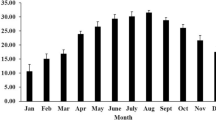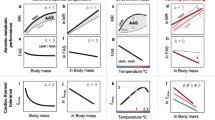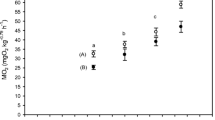Abstract
The metabolic response of fish to exercise is highly dependent on environmental factors such as temperature. In addition to natural challenges that force exercise (foraging, avoiding predators, etc.), sportfish species are also subjected to exercise when they are hooked by anglers, leading to metabolic energy costs that may impact fitness. While several studies have examined the physiological response of fish to capture in warm conditions, little work has examined this response under cold winter conditions when fish are targeted by ice-anglers. To fill this gap, we examined the metabolic impacts of exercise duration and air exposure on bluegill, Lepomis macrochirus, at a temperature typical for ice angling. Thirty-two bluegill were subjected to a simulated angling session which included either a light (30 s) or exhaustive exercise procedure, followed by either 30 s or 4 min of air exposure. Fish were then assessed at 5 °C for the following metabolic metrics using intermittent-flow respirometry: standard metabolic rate (SMR), maximum metabolic rate (MMR), aerobic scope (AS), recovery time, and excess post-exercise oxygen consumption (EPOC). Fish exercised to exhaustion had higher EPOC compared to lightly exercised fish, however EPOC was not affected by air exposure time. No other metrics were impacted by air exposure or exercise duration. These results are directly applicable to physiological outcomes for fish captured by ice-anglers during the winter and suggest that both low temperatures and low durations of exercise serve to keep metabolic costs low for fish angled during the winter months.


Similar content being viewed by others
References
Arlinghaus R, Klefoth T, Cooke SJ et al (2009) Physiological and behavioural consequences of catch-and-release angling on northern pike (Esox lucius L.). Fish Res 97:223–233. https://doi.org/10.1016/j.fishres.2009.02.005
Bartholomew A, Bohnsack JA (2005) A review of catch-and-release angling mortality with implications for no-take reserves. Rev Fish Biol Fish 15:129–154. https://doi.org/10.1007/s11160-005-2175-1
Beitinger TL, Fitzpatrick LC (1979) Physiological and ecological correlates of preferred temperature in fish. Am Zool 19:319–329. https://doi.org/10.1093/icb/19.1.319
Binder TR, Wilson ADM, Wilson SM et al (2016) Is there a pace-of-life syndrome linking boldness and metabolic capacity for locomotion in bluegill sunfish? Anim Behav 121:175–183. https://doi.org/10.1016/j.anbehav.2016.09.006
Brett J (1964) The respiratory metabolism and swimming performance of young sockeye salmon. J Fish Board Canada
Brownscombe JW, Griffin LP, Gagne T et al (2015) Physiological stress and reflex impairment of recreationally angled bonefish in Puerto Rico. Environ Biol Fish 98:2287–2295. https://doi.org/10.1007/s10641-015-0444-y
Castanheira MF, Martins CIM, Engrola S, Conceição LEC (2011) Daily oxygen consumption rhythms of Senegalese sole solea senegalensis (Kaup, 1858) juveniles. J Exp Mar Biol Ecol 407:1–5. https://doi.org/10.1016/j.jembe.2011.06.036
Clark TD, Messmer V, Tobin AJ et al (2017) Rising temperatures may drive fishing-induced selection of low-performance phenotypes. Sci Rep 7:40571. https://doi.org/10.1038/srep40571
Clement TA, Murry BA, Uzarski DG (2015) Fish community size structure of small lakes: the role of lake size, biodiversity and disturbance. J Freshw Ecol 30:557–568. https://doi.org/10.1080/02705060.2015.1030787
Cook KV, Lennox RJ, Hinch SG, Cooke SJ (2015) FISH out of WATER how much air is too much? Fisheries 40:452–461. https://doi.org/10.1080/03632415.2015.1074570
Cooke SJ, Suski CD (2005) Do we need species-specific guidelines for catch-and-release recreational angling to effectively conserve diverse fishery resources? Biodivers Conserv 14:1195–1209. https://doi.org/10.1007/s10531-004-7845-0
Cooke SJ, Schreer JF, Wahl DH, Philipp DP (2002) Physiological impacts of catch-and-release angling practices on largemouth bass and smallmouth bass. Am Fish Soc Symp 31:489–512
Cooke SJ, Grant EC, Schreer JF, Philipp DP, Devries AL (2003) Low temperature cardiac response to exhaustive exercise in fish with different levels of winter quiescence. Comp Biochem Physiol Part A Mol Integr Physiol 134A:157–165. https://doi.org/10.1016/S1095-6433(02)00240-4
Davis KB (2004) Temperature affects physiological stress responses to acute confinement in sunshine bass (Morone chrysops×Morone saxatilis). Comp Biochem Physiol Part A Mol Integr Physiol 139:433–440. https://doi.org/10.1016/j.cbpb.2004.09.012
Dubois RB, Margenau TL, Stewart RS et al (1994) Hooking mortality of northern pike angled through ice. North Am J Fish Manage 14:769–775. https://doi.org/10.1577/1548-8675(1994)014<0769:HMONPA>2.3.CO;2
Evans DO (1984) Temperature Independence of the annual cycle of standard metabolism in the pumpkinseed. Trans Am Fish Soc 113:494–512. https://doi.org/10.1577/1548-8659(1984)113<494:TIOTAC>2.0.CO;2
Fry JFE (1971) The effect of environmental factors on the physiology of fish. Fish Physiol 6:1–98
Fullerton AH, Garvey JE, Wright RA, Stein RA (2000) Overwinter growth and survival of largemouth bass: interactions among size, food, origin, and winter severity. Trans Am Fish Soc 129:1–12. https://doi.org/10.1577/1548-8659(2000)129<0001:OGASOL>2.0.CO;2
Gaeta JW, Beardmore B, Latzka AW, Provencher B, Carpenter SR (2013) Catch-and-release rates of sport fishes in Northern Wisconsin from an angler diary survey. North Am J Fish Manag 33:606–614. https://doi.org/10.1080/02755947.2013.785997
Gale MK, Hinch SG, Eliason EJ et al (2011) Physiological impairment of adult sockeye salmon in fresh water after simulated capture-and-release across a range of temperatures. Fish Res 112:85–95. https://doi.org/10.1016/j.fishres.2011.08.014
Galloway BJ, Kieffer JD (2003) The effects of an acute temperature change on the metabolic recovery from exhaustive exercise in juvenile Atlantic salmon (Salmo salar). Physiol Biochem Zool 76:652–662. https://doi.org/10.1086/376921
Garvey JE, Wright RA, Stein RA (1998) Overwinter growth and survival of age-0 largemouth bass (Micropterus salmoides): revisiting the role of body size. Can J Fish Aquat Sci 55:2414–2424. https://doi.org/10.1139/cjfas-55-11-2414
Garvey JE, Ostrand KG, Wahl DH (2004) Energetics, predation, and ration affect size-dependent growth and mortality of fish during winter. Ecology 85:2860–2871. https://doi.org/10.1890/03-0329
Gingerich AJ, Cooke SJ, Hanson KC et al (2007) Evaluation of the interactive effects of air exposure duration and water temperature on the condition and survival of angled and released. Fish. Res 86:169–178. https://doi.org/10.1016/j.fishres.2007.06.002
Guderley H (2004) Metabolic responses to low temperature in fish muscle. Biol Rev 79:409–427. https://doi.org/10.1017/S1464793103006328
Hasler CT, Suski CD, Hanson KC et al (2009) Effect of water temperature on laboratory swimming performance and natural activity levels of adult largemouth bass. Can J Zool 87:589–596. https://doi.org/10.1139/Z09-044
Hyvarinen P, Heinimaa S, Rita H (2004) Effects of abrupt cold shock on stress responses and recovery in brown trout exhausted by swimming. J Fish Biol 64:1015–1026. https://doi.org/10.1111/j.1095-8649.2004.00367.x
Kieffer JD (2000) Limits to exhaustive exercise in fish. Comp Biochem Physiol Part A Mol Integr Physiol 126:161–179. https://doi.org/10.1016/S1095-6433(00)00202-6
Kieffer J, Currie S, Tufts B (1994) Effects of environmental temperature on the metabolic and acid-base responses of rainbow trout to exhaustive exercise. J Exp Biol 194:299–317
Killen SS, Mitchell MD, Rummer JL et al (2014) Aerobic scope predicts dominance during early life in a tropical damselfish. Funct Ecol 28:1367–1376. https://doi.org/10.1111/1365-2435.12296
Killen SS, Reid D, Marras S, Domenici P (2015) The interplay between aerobic metabolism and antipredator performance: vigilance is related to recovery rate after exercise. Front Physiol 6:111. https://doi.org/10.3389/fphys.2015.00111
Lee CG, Farrell AP, Lotto A et al (2003) Excess post-exercise oxygen consumption in adult sockeye (Oncorhynchus nerka) and coho (O. kisutch) salmon following critical speed swimming. J Exp Biol 206:3253–3260. https://doi.org/10.1242/jeb.00548
Louison MJ, Hasler CT, Fenske MM et al (2017a) Physiological effects of ice-angling capture and handling on northern pike, Esox lucius. Fish Manag Ecol 24:10–18. https://doi.org/10.1111/fme.12196
Louison MJ, Hasler CT, Raby GD et al (2017b) Chill out: physiological responses to winter ice-angling in two temperate freshwater fishes. Conserv Physiol 5:cox027. https://doi.org/10.1093/conphys/cox027
Louison MJ, Stein J, Suski C (2018) Metabolic phenotype is not associated with vulnerability to angling in bluegill sunfish. Can J Zool:cjz-2017–cjz-0363. https://doi.org/10.1139/cjz-2017-0363
Margenau TL, Gilbert SJ, Hatzenbeler GR (2003) Angler catch and harvest of northern pike in northern Wisconsin lakes. North Am J Fish Manage 23:307–312. https://doi.org/10.1577/1548-8675(2003)023<0307:ACAHON>2.0.CO;2
McArley TJ, Herbert NA (2014) Mortality, physiological stress and reflex impairment in sub-legal Pagrus auratus exposed to simulated angling. J Exp Mar Biol Ecol 461:61–72. https://doi.org/10.1016/j.jembe.2014.07.016
McDermot D, Rose KA (2000) An individual-based model of lake fish communities: application to piscivore stocking in Lake Mendota. Ecol Model 125:67–102. https://doi.org/10.1016/S0304-3800(99)00172-6
McKenzie DJ (2011) Swimming and other activities - energetics of fish swimming. In: Encyclopedia of Fish Physiology. pp 1636–1644
Meka JM, McCormick SD (2005) Physiological response of wild rainbow trout to angling: impact of angling duration, fish size, body condition, and temperature. Fish Res 72:311–322. https://doi.org/10.1016/j.fishres.2004.10.006
Milligan CL (1996) Metabolic recovery from exhaustive exercise in rainbow trout. Comp Biochem Physiol Part A Physiol 113:51–60. https://doi.org/10.1016/0300-9629(95)02060-8
Mishra V, Cherkauer KA, Bowling LC (2011) Changing thermal dynamics of lakes in the Great Lakes region: role of ice cover feedbacks. Glob Planet Chang 75:155–172. https://doi.org/10.1016/j.gloplacha.2010.11.003
Nedrow J, Scholnick D, Gleeson T (2001) Roles of lactate and catecholamines in the energetics of brief locomotion in an ectothermic vertebrate. J Comp Physiol B Biochem Syst Environ Physiol 171:237–245. https://doi.org/10.1007/s003600000168
Nelson JA, Chabot D (2011) General energy metabolism. Encycl Fish Physiology from Genome to Environ 1–3:1566–1572
O’Hara J (1968) The influence of weight and temperature on the metabolic rate of sunfish. Ecology 49:159–161. https://doi.org/10.2307/1933575
Pang X, Cao Z-D, Peng J-L, Fu S-J (2010) The effects of feeding on the swimming performance and metabolic response of juvenile southern catfish, Silurus meridionalis, acclimated at different temperatures. Comp Biochem Physiol Part A Mol Integr Physiol 155:253–258. https://doi.org/10.1016/j.cbpa.2009.11.005
Pang X, Yuan X-Z, Cao Z-D et al (2015) The effect of temperature on repeat swimming performance in juvenile qingbo (Spinibarbus sinensis). Fish Physiol Biochem 41:19–29. https://doi.org/10.1007/s10695-014-0002-0
Policansky D (2008) Chapter 11 - trends and development in catch and release. In: Aas O (ed) Global challenges in recreational fisheries. Wiley-Blackwell, Hoboken, pp 202–236
Portner HO, Knust R (2007) Climate change affects marine fishes through the oxygen limitation of thermal tolerance. Science 315(80):95–97. https://doi.org/10.1126/science.1135471
Pottinger TG (2010) A multivariate comparison of the stress response in three salmonid and three cyprinid species: evidence for inter-family differences. J Fish Biol 76:601–621. https://doi.org/10.1111/j.1095-8649.2009.02516.x
Raby GD, Clark TD, Farrell AP et al (2015) Facing the river gauntlet: understanding the effects of fisheries capture and water temperature on the physiology of Coho Salmon. PLoS One 10:e0124023–e0124023. https://doi.org/10.1371/journal.pone.0124023
Reidy SP, Kerr SR, Nelson JA (2000) Aerobic and anaerobic swimming performance of individual Atlantic cod. J Exp Biol 203:347–357
Rome LC, Loughna PT, Goldspink G (1984) Muscle fiber activity in carp as a function of swimming speed and muscle temperature. Am J Phys 247:R272–R279
Rosewarne PJ, Wilson JM, Svendsen JC (2016) Measuring maximum and standard metabolic rates using intermittent-flow respirometry: a student laboratory investigation of aerobic metabolic scope and environmental hypoxia in aquatic breathers. J Fish Biol 88:265–283. https://doi.org/10.1111/jfb.12795
Scarabello M, Heigenhauser GJ, Wood C (1991) The oxygen debt hypothesis in juvenile rainbow trout after exhaustive exercise. Respir Physiol 84:245–259. https://doi.org/10.1016/0034-5687(91)90121-X
Segal SS, Brooks GA (1979) Effects of glycogen depletion and work load on postexercise O2 consumption and blood lactate. J Appl Physiol 47:514–521
Shoup DE, Wahl DH (2008) The effect of largemouth bass predation on overwinter survival of two size-classes of Age-0 bluegills. Trans Am Fish Soc 137:1063–1071. https://doi.org/10.1577/T07-038.1
Sidell BD, Moerland TS (1989) Effects of temperature on muscular function and Locomotory performance in teleost fish. Springer, Berlin, Heidelberg, pp 115–156
Suski CD, Ridgway MS (2009) Winter biology of Centrarchid fishes. In: Centrarchid fishes. Wiley-Blackwell, Oxford, pp 264–292
Suski CD, Killen SS, Kieffer JD, Tufts BL (2006) The influence of environmental temperature and oxygen concentration on the recovery of largemouth bass from exercise: implications for live-release angling tournaments. J Fish Biol 68:120–136. https://doi.org/10.1111/j.0022-1112.2006.00882.x
Suski CD, Cooke SJ, Danylchuk AJ et al (2007) Physiological disturbance and recovery dynamics of bonefish (Albula vulpes), a tropical marine fish, in response to variable exercise and exposure to air. Comp Biochem Physiol Part A Mol Integr Physiol 148:664–673. https://doi.org/10.1016/j.cbpa.2007.08.018
Svendsen JC, Tudorache C, Jordan AD et al (2010) Partition of aerobic and anaerobic swimming costs related to gait transitions in a labriform swimmer. J Exp Biol 213:2177–2183. https://doi.org/10.1242/jeb.041368
Thibault M, Blier PU, Guderley H (1997) Seasonal variation of muscle metabolic organization in rainbow trout (Oncorhynchus mykiss). Fish Physiol Biochem 16:139–155. https://doi.org/10.1007/BF00004671
Tonn WM, Langlois PW, Prepas EE et al (2004) Winterkill cascade: indirect effects of a natural disturbance on littoral macroinvertebrates in boreal lakes. J North Am Benthol Soc 23:237–250. https://doi.org/10.1899/0887-3593(2004)023<0237:WCIEOA>2.0.CO;2
Twardek WM, Lennox RJ, Lawrence MJ et al (2018) The Postrelease survival of walleyes following ice-angling on Lake Nipissing, Ontario. North Am J Fish Manage 38:159–169. https://doi.org/10.1002/nafm.10009
Wakefield AM, Cunjak RA, Kieffer JD (2004) Metabolic recovery in Atlantic salmon fry and parr following forced activity. J Fish Biol 65:920–932. https://doi.org/10.1111/j.0022-1112.2004.00492.x
Warrenchuck JJ, Shirley TC (2002) Effects of windchill on the snow crab (Chionoecetes opilio). In: Crabs in cold water regions: biology, management, and economics. University of Alaska Fairbanks, Alaska Sea Grant, pp 81–96
Wieser W, Koch F, Drexel E, Platzer U (1986) “Stress” reactions in teleosts: effects of temperature and activity on anaerobic energy production in roach (Rutilus rutilus L.). Comp Biochem Physiol Part A Physiol 83:41–45. https://doi.org/10.1016/0300-9629(86)90085-X
Wilkie MP, Brobbel MA, Davidson K et al (1997) Influences of temperature upon the postexercise physiology of Atlantic salmon (Salmo salar). Can J Fish Aquat Sci 54:503–511. https://doi.org/10.1139/cjfas-54-3-503
Wood CM (1991) Acid-Base and ion balance, metabolism, and their interactions, after exhaustive exercise in fish. J Exp Biol 160:285–308
Xu C, Letcher BH, Nislow KH (2010) Context-specific influence of water temperature on brook trout growth rates in the field. Freshw Biol. https://doi.org/10.1111/j.1365-2427.2010.02430.x
Acknowledgements
The authors would like to thank Justin Rondón for his assistance with all aspects of executing the experiments. This research was funded by Federal Aid in Sport Fish Restoration Project via the United States Fish and Wildlife Service, project F-69-R to J.A.S. All research was performed in accordance with guidelines established by the University of Illinois at Urbana Champaign Institutional Animal Care and Use Committee (IACUC), protocol # 15169.
Author information
Authors and Affiliations
Corresponding author
Rights and permissions
About this article
Cite this article
Winter, H.N., Louison, M.J., Stein, J.A. et al. Metabolic response of bluegill to exercise at low water temperature: implications for angling conservation. Environ Biol Fish 101, 1657–1667 (2018). https://doi.org/10.1007/s10641-018-0814-3
Received:
Accepted:
Published:
Issue Date:
DOI: https://doi.org/10.1007/s10641-018-0814-3




